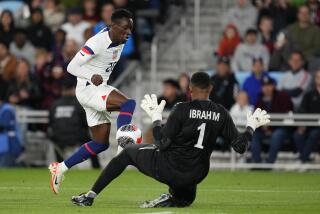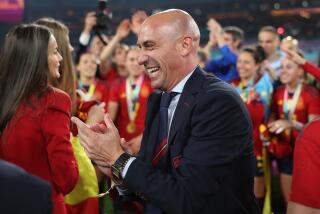FIFA President Seeking Another Term
ZURICH, Switzerland — Sepp Blatter wants more time to smarten up soccer’s murky image.
After a quarter-century at the top levels of soccer’s world governing body, the FIFA president remains frustrated there’s so much wrong with the global game.
“If I look down I am happy. If I look up and look at the national teams I am happy,” he said. “But what is in between -- the big leagues, the big clubs, the so-called rich clubs, then I’m not happy.
“When it comes to moneymaking then, all of a sudden, the rich are becoming richer and the poor, where are they?”
Blatter, who was elected FIFA president in 1998 after 17 years as Joao Havelange’s secretary-general, plans to seek a third term next year.
“I have not finished my mission in FIFA,” he said. “I will give all the energy I have and all those who believe in the good of the game. Because we have to take care of the game.”
Like the vast majority of soccer fans who can’t wait for the World Cup’s June 9 kickoff in Germany, Blatter hopes the tournament will have all the good attributes of the most popular sport on earth: plenty of goals, saves, great passing and dribbling, comebacks, upsets and memorable moments.
But he’s realistic enough to know that the downside of the game won’t be far away and that cheating, doping, fan violence, racism and match-rigging will be hovering over the World Cup like threatening clouds.
“Corruption, match-fixing, doping, these are the evils of the game,” said the 70-year-old Blatter, who is Swiss. “We are working on a task force for the good of the game to try and bring football back within the boundaries. We have realized the universality of our game. But perhaps we were too naive to think that football at all levels would be respectful, disciplined and loyal.”
Blatter, who started out at FIFA in 1975 and became secretary-general six years later, rose quickly through the ranks. As secretary-general and then president, he has overseen huge growth in the organization.
Blatter often used to joke that, when he joined FIFA in 1975, he was the 11th member of the administration staff and that his arrival “made up a full team.” There were about 20 staff members in 1981 when he took over as secretary-general.
Now, that number has risen to 280. FIFA is moving its headquarters next month, a five-minute drive away, because the new building has far more space.
While not scared to criticize clubs and leagues, Blatter has attracted ridicule with some of his pronouncements, including the time he called on female players to wear skimpier, tighter shorts.
Like Havelange, Blatter has been accused of being autocratic. There was fury within the game when, weeks before the presidential election four years ago, Blatter suspended a probe into FIFA’s finances after the collapse of its marketing partner ISL/ISMM.
He says he is trying to carry on a mission begun by Brazilian lawyer Havelange, who stepped down as FIFA president eight years ago after 24 years in charge.
“The good thing we have done is to make football popular all around the world not only in fact but also in figures,” Blatter said.
“But this world is not wonderful. With 250 million participants they cannot all be good. It’s impossible. They are cheating, they are violent. It’s like the population. We have to keep football within the boundaries of the game, and this is very difficult now.”
Blatter also said he is fighting a battle to preserve the game at grass-roots and national team levels. He believes the sport is being dominated by a small group of greedy European clubs.
“How can the young players have a chance if they are in the youth team of Bayern or Barcelona?” he said. “Can they one day be in the first team? No, it’s no longer possible. The coach will not make any experiments with young players. When the [transfer] market is open, you go to the market and you buy the players.”
Blatter is opposed by the so-called G14 clubs -- the European powerhouses that dominate their own domestic championships and the Champions League.







